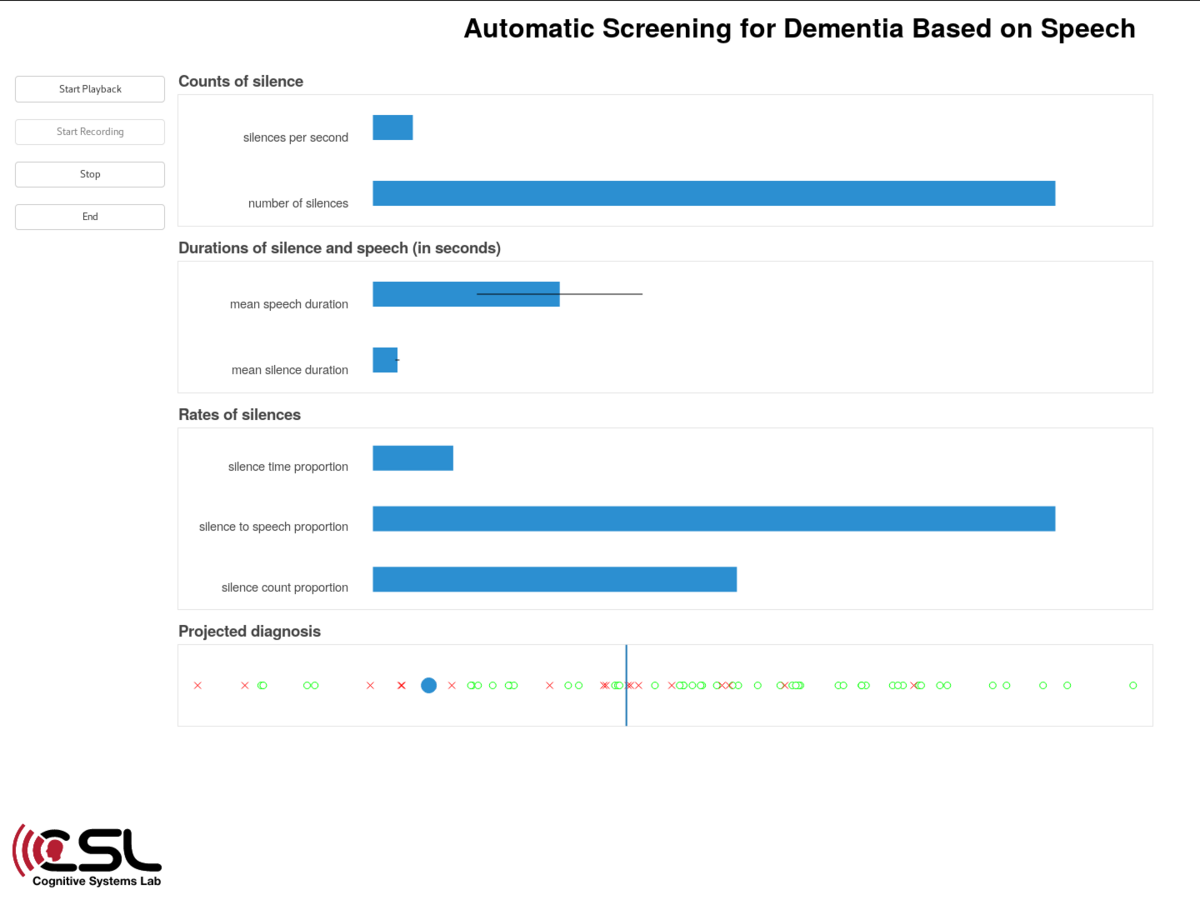ALMED
Acoustic and Linguistic Features for Early Detection of Cognitive Deficits
The demographic development in Germany is accompanied by an increase in geriatric diseases. Their most common representative is dementia, a chronic progressive disease that is accompanied by loss of autonomy in all areas of life. As no curative therapy is known, early secondary prevention measures are of great importance. Current diagnostic procedures require a thorough examination by medical specialists which cannot be offered comprehensively for cost and time reasons. Scientific studies show that speech capacity is an important indicator of dementia.
The aim of the proposed project ALMED is to identify and develop automatic methods that examine a person's speech capacity for prototypic indicators of cognitive deficits in real-time and fully automatically, and to present the results so that specialists can include them as an additional source of information when diagnosing cognitive deficits. The development and evaluation of a fully automated speech analysis method will be based on data and experience from the established interdisciplinary longitudinal study on adulthood and ageing (ILSE) in which over the course of 20 years medical, psychiatric and neuropsychological parameters as well as 10,000 hours of interviews were collected from more than 1,000 subjects. In the ALMED project, a scientifically sound selection of reliable, robust acoustic and linguistic features will be extracted from speech fully automatically and examined for its potential for the early detection of cognitive deficits, and appropriate forms of presenting this information will be found. Moreover, the transcripts of the interviews generated during the project will unlock a unique resource for geriatricians and gerontologists on the basis of which new scientific insights into the relationship between speech and dementia are to be expected on a representative sample. The automated speech analysis extends the potential of previous methods since it can take place both directly during interpersonal communication, and indirectly across great distances or at a later time. Furthermore, the automation provides a detailed analysis and evaluation of speech capability which is independent of the time resources of medical specialists. Thus, there is reason to hope that such automated support will in the future enable a cost-effective and widespread early detection of cognitive deficits. Therapy can consequently be offered to patients at a time when the disease can still be influenced, circumstances can be moderated and complications can be mitigated.
Partner: Prof. Dr. med. Johannes Schröder, Universitätsklink Heidelberg, Sektion Gerontopsychiatrie
Funded by DFG 2019-2021
Contact: Prof. Dr.-Ing. Tanja Schultz, Ayimnisagul Ablimit M.Sc., Jochen Weiner M.Sc.
Publications
Autobiographical Memory in Healthy Aging: a Decade-long Longitudinal Study, Aging, Neuropsychology, and Cognition (Frankenberg, C., Knebel, M., Degen, C., Siebert, J.S., Wahl, H.-W, & Schröder, J. , 2021)
Verbal fluency in normal aging and cognitive decline: Results of a longitudinal study (Frankenberg, C., Weiner, J., Knebel, M., Abulimiti, A., Toro, P., Herold, C. J., Schultz, T., & Schröder, J. 2021), Computer speech & language, 68.
Automatic Speech Recognition for ILSE-Interviews: Longitudinal Conversational Speech Recordings covering Aging and Cognitive Decline (Ayimunishagu Abulimiti, Jochen Weiner, Tanja Schultz), In Proc. Interspeech 2020, 2020.
Cerebral correlates of autobiographical memory in MCI and AD: Evidence from a positron‐emission tomography study. Alzheimer's Dement (Frankenberg, C., Schröder, J., Haberkorn, U., Degen, C., & Buchsbaum, M.S., 2020)
Perplexity – a new predictor of cognitive changes in spoken language? – results of the Interdisciplinary Longitudinal Study on Adult Development and Aging (ILSE) (Frankenberg, C., Weiner, J., Schultz, T., Knebel, M., Degen, C., Wahl, H.-W., & Schroeder, J., 2019 ). Linguistics vanguard: multimodal online journal, 5(2).
Manual and Automatic Transcription in Dementia Detection from Speech (Jochen Weiner, Mathis Engelbart, Tanja Schultz), In INTERSPEECH 2017 – 18\textsuperscriptth Annual Conference of the International Speech Communication Association, 2017.
Towards Automatic Transcription of ILSE – an Interdisciplinary Longitudinal Study of Adult Development and Aging (Jochen Weiner, Claudia Frankenberg, Dominic Telaar, Britta Wendelstein, Johannes Schröder, Tanja Schultz), In Proceedings of the Tenth International Conference on Language Resources and Evaluation (LREC'16), 2016.
Speech-Based Detection of Alzheimer's Disease in Conversational German (Jochen Weiner, Christian Herff, Tanja Schultz), In INTERSPEECH 2016 – 17th Annual Conference of the International Speech Communication Association, 2016.
Detection of Intra-Personal Development of Cognitive Impairment From Conversational Speech (Jochen Weiner, Tanja Schultz), In 12th ITG Conference on Speech Communication, 2016.


